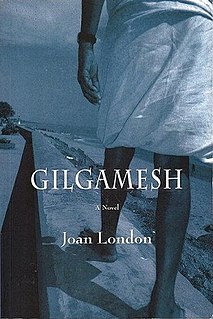 W
WBharat Ek Khoj is a 53-episode Indian historical drama based on the book The Discovery of India (1946) by Jawaharlal Nehru that covers a 5,000-year history of India from its beginnings to independence from the British in 1947. The drama was directed, written and produced by Shyam Benegal with cinematographer V. K. Murthy in 1988 for state-owned Doordarshan. Shama Zaidi co-wrote the script. Its cast included Om Puri, Roshan Seth, Tom Alter and Sadashiv Amrapurkar. Jawaharlal Nehru was portrayed by Roshan Seth, the same role he portrayed in the Oscar-winning film Gandhi.
 W
WGilgamesh, published in 2001, is the first full-length novel written by Joan London. It is inspired by the Epic of Gilgamesh, the world's oldest known poem.
 W
WThe Epic of Gilgamesh has directly inspired many manifestations of literature, art, music, and popular culture, as identified by Theodore Ziolkowski in the book Gilgamesh Among Us: Modern Encounters With the Ancient Epic (2011). It was only during and after the First World War that the first reliable translations of the epic appeared that reached a wide audience, and it was only after the Second World War that the epic of Gilgamesh began to make itself felt more broadly in a variety of genres. In the years following World War II, Gilgamesh, formerly an obscure figure known only by a few scholars, gradually became increasingly popular with modern audiences. The Epic of Gilgamesh's existential themes made it particularly appealing to German authors in the years following the war. In his 1947 existentialist novel Die Stadt hinter dem Strom, the German novelist Hermann Kasack adapted elements of the epic into a metaphor for the aftermath of the destruction of World War II in Germany, portraying the bombed-out city of Hamburg as resembling the frightening Underworld seen by Enkidu in his dream. In Hans Henny Jahnn's magnum opus River Without Shores (1949–1950), the middle section of the trilogy centers around a composer whose twenty-year-long homoerotic relationship with a friend mirrors that of Gilgamesh with Enkidu and whose masterpiece turns out to be a symphony about Gilgamesh.
 W
WGilgamesh the immortal is an Argentine comic book created by Lucho Olivera and published by Editorial Columba. It is freely based in the famous Epic of Gilgamesh, and features Gilgamesh as an ancient king that met an alien who turned him into immortal by using his advanced technology. The story of the character spans from that point to the death of the human race during an atomic holocaust, a space journey, the establishment of the human race on another planet and his eventual return to earth. The comic book was first published in 1969.
 W
WGilgamesh the King is a 1984 historical novel by American writer Robert Silverberg, presenting the Epic of Gilgamesh as a novel. In the afterword the author wrote "at all times I have attempted to interpret the fanciful and fantastic events of these poems in a realistic way, that is, to tell the story of Gilgamesh as though he were writing his own memoirs, and to that end I have introduced many interpretations of my own devising which for better or for worse are in no way to be ascribed to the scholars".
 W
WSlaves of the Shinar is a historical fantasy novel that was written by Justin Allen and published in 2006. The book explores the early lives and origins of characters and peoples to be found in Middle Eastern myths and religious texts, especially the Biblical Book of Genesis and the Epic of Gilgamesh. Included from Genesis are depictions of the Nephilim, Jared, Lamech and Adah. The name Shinar also comes from the book of Genesis, chapter ten. Likewise, from the Epic of Gilgamesh and related middle-eastern myths come such figures as Gilgamesh, Enkidu and the gods Marduk, Baal, and Moloch.
 W
WTimewyrm: Genesys is an original Doctor Who novel, published by Virgin Publishing in their New Adventures range of Doctor Who novels. It was the first book in that series, and was thought of by some fans as a continuation of the television series; in effect, a Season 27 to follow the televised Season 26.